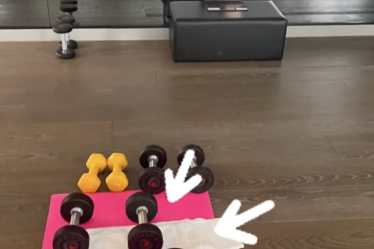Founded by Shin Sang Hyun and led by chief executive Oh Sang Hyeon, Hyaloid provides customisable templates for brands, businesses and talent to create their own social commerce applications — designed to reduce operating costs and increase transparency across the supply chain.
On the platform, brands and users are able to adjust layouts, add video, photos, music content features as well as e-commerce functions and modules, which essentially create a virtual flagship store through its in-app check-out tools. Hyaloid-powered applications embed a rewarding mechanism, in the form of commissions, for influencers and users promoting their favourite brands and products on the app.
Once launched, each app has the ability to welcome regular users, content creators, influencers and potential partnering brands who can sign in and create their own profiles in-app, which Hyaloid calls “My Room.” Data gathered by Hyaloid from the in-app activities are shared with brand partners.
Demonstrating the capabilities of the platform, over the last two years, Hyaloid has developed its own luxury fashion brand — Maison du Dodo — which it has built on sustainable and responsible business principles. Indeed, the brand aims to attract an ecosystem of environmental social governance, or ESG-driven brands and consumers to join its community on the platform.
Now, BoF sits down with Hyaloid’s CEO, Oh Sang Hyeon, for insight into how Hyaloid aims to evolve the traditional direct-to-consumer business model, and how Maison du Dodo demonstrates use cases for ESG-driven brands and consumers.
What are the most compelling benefits to using the Hyaloid platform?
Today, you can access any form of content and product through your smartphone and applications based all around the world without time or place limitation. As a user, you are able to express who you really are, and as a brand, it is an effective tool to showcase your brand’s identity, heritage and history in an efficient way. This is critical to the success of digital commerce of today.
Without Hyaloid’s platform, you would have to go into different applications and different websites. For example, if you want to buy luxury goods, then you would go to Farfetch. If you want to listen to music, you go to Spotify. And every time you do that, you have to either sign up or login and put your personal information in every time you do something different. But with us, since we can do everything with one password, it will be a lot easier for our users.
This is the era of buying not only product, but also buying through content, and because of our item link system, it happens in a more natural way that doesn’t feel like it’s an advertisement. Enabling the user to see now, buy now more efficiently.
How do you measure the impact of using the platform?
The longer users stay on our platform is really the key factor in how we measure success. Time spent on our platform, those sales numbers are what we use to measure success of this digital commerce. Through Hyaloid, you have data sovereignty. This means the data accumulated in our platform system is the brand’s data. They will have access to data of how their content or their products were distributed through the platform so they can build better strategies to reach global fans.
But more importantly, we want to focus on the use of the function we call “My Room,” where each app-account has the ability to welcome regular users, content creators, influencers and potential partnering brands who can sign in and create their own profiles in-app. Here, the data gathered from in-app activities are shared with brand partners.
This enables us to accumulate a new data-set that is currently not out there and not available, to truly understand interrelated behaviours and inspiration. Brands and individuals can be connected to actual transactions. As the platform, we can exactly measure activities to assess profit share. If you can start to give this data to the brands and the individuals right away, I believe we will be successful.
How does your ‘item link’ system work and what impact does it have?
There are three ways to link products on the Hyaloid platform. This can be done by: a brand that is authorised by Hyaloid to upload products; any user who has purchased a specific product at least once on the platform; or an influencer or celebrity who has obtained a product link from a brand.
If you can meet in the virtual world directly, it’s natural to have direct logistics from the company to the consumer.
By linking products to My Room, we have the ability to essentially create a boutique store and by linking products to content, we can naturally introduce and promote the products. Here, if a product is not sold directly by a user, but the “sale” occurs through an “item link,” the owner of that specific My Room receives a commission or profit share — another additional benefit for users of our platform.
We can now enable you to directly contact and directly transact. If you can meet in the virtual world directly, it’s natural to have direct logistics from the company to the consumer. So, it’s not that we are focusing on the DTC, but our platform is designed for DTC environments. We are saving a lot of resources since we can do everything on our one platform — all content and products linked in one place so that means we can save servers.
How does Hyaloid help partners achieve global reach?
Each brand can have their own applications. Say, for example, as a fan club community on the app, a famous band might have 100 million followers. That fanbase can have their own platform on Hyaloid. Products that members of that band wear will be identified and present on their fan club platform. So, those products could gain global reach because of our ecosystem and millions of followers on the fanbase page are now exposed to those products.
When the internet came out around 30 years ago, many entities and individuals thought they could finally better contact each other, but that was not true. You had to build your own homepages and own servers. That is where they put a lot of IDs and passwords, to have the borders so they can dominate the data service. This is why we have made it possible to access each space with only one ID.
How are you exploring the relationship between DTC and ESG?
We will launch an eco-friendly community platform on the Hyaloid platform, starting with Maison du DoDo, where we bring together brands, artists, ambassadors and users who share the same passions. Through this platform, they can come together to form an address book-type community and communicate through their My Room, feed, commerce and chat.
What are your future plans for Maison du Dodo?
We plan to open flagship stores in Milan, Paris, New York, Tokyo and Seoul. In addition, we plan to expand our range with various high-end products. From fashion to fountain pens, pottery, leather goods, even chess or playing cards and chips — with the idea that most of them will be limited edition.
With Maison du Dodo, the success is that we maintain three values that are almost impossible to combine — high quality, eco-friendly and sustainable — but at the same time, accessibly priced. We are focusing on ESG as our first project of Hyaloid, representing our truest value — that we have to save the environment. After launching Maison du Dodo, we aim to find the partners and brands who prioritise ESG to create a community of ESG on the Hyaloid platform.
This is a sponsored feature paid for by Hyaloid as part of a BoF partnership.



